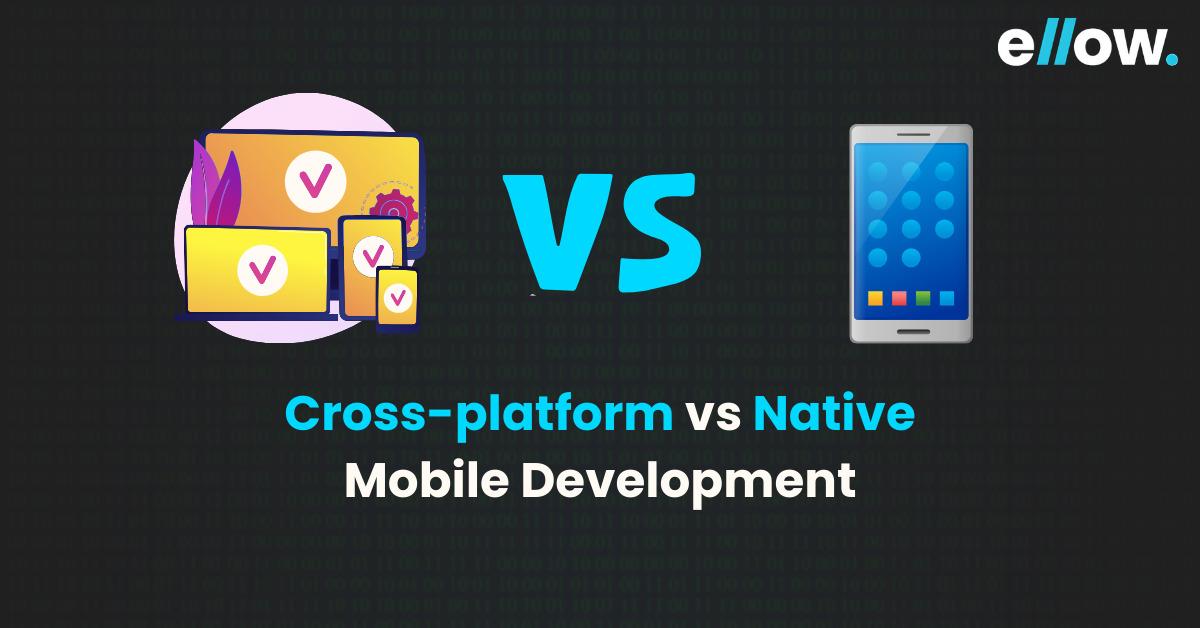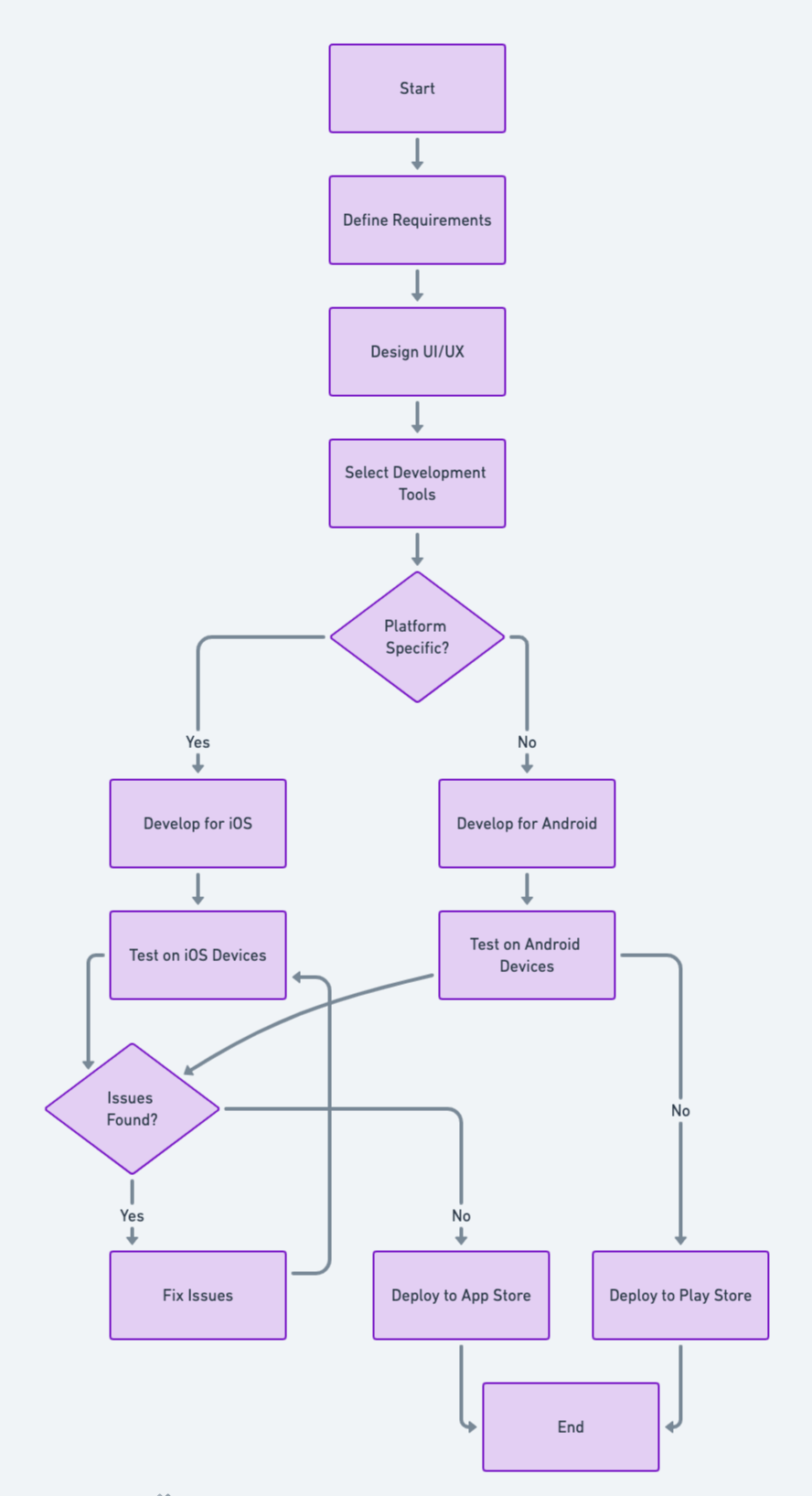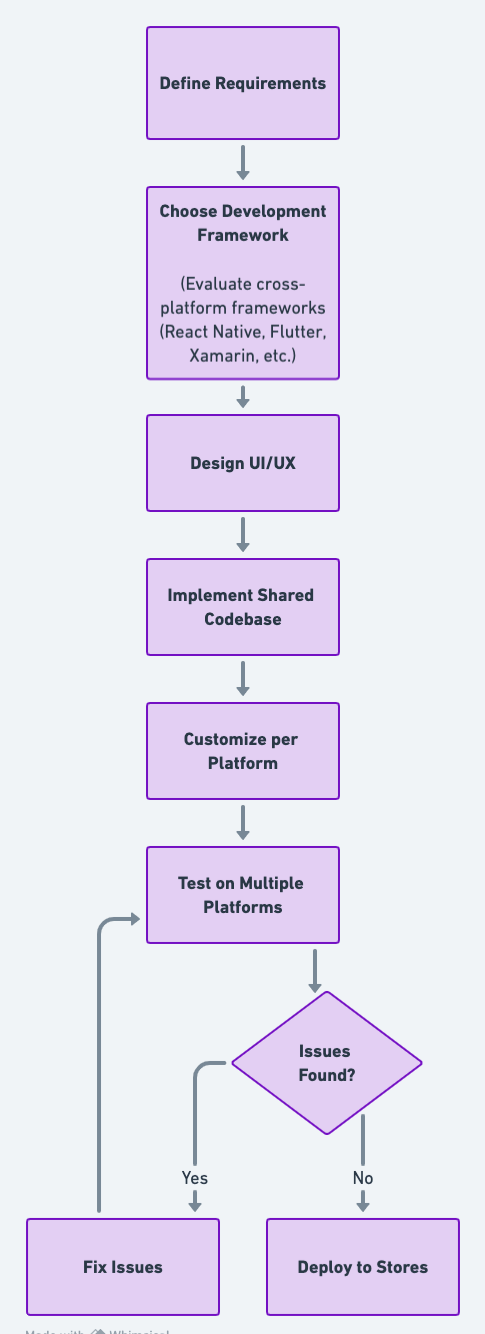Let’s build the future together.
Great ideas need great people. Partner with us to bring your vision to life, or take the first step in your career by joining our team of innovators.

Smartphones have transformed into essential tools for communication and entertainment. Developers now create applications ranging from augmented reality to weather updates, catering to diverse user needs.
When crafting mobile apps, choosing the right development approach is very important. Developers often focus on specific operating systems like Android or iOS to optimize the user experience.
The development process broadly falls into two categories: native development, tailored for a specific OS, and cross-platform development, reaching multiple systems.
Selecting between native and cross-platform development is a pivotal decision, that influences the app’s design, underlying technologies, and user accessibility. This choice significantly shapes the success of any mobile app project.
According to Statista developer survey, Flutter stands out as the leading cross-platform mobile framework embraced by developers worldwide. The survey reveals that 46 percent of software developers opt for Flutter.
In the broader landscape, approximately one-third of mobile developers leverage cross-platform technologies or frameworks, with the remaining developers relying on native tools.
Native app development involves creating mobile applications specifically tailored for a particular operating system, such as Android or iOS. Developers use platform-specific programming languages, like Java or Kotlin for Android and Objective-C or Swift for iOS, ensuring optimal performance and integration with the chosen platform.

The development process utilizes dedicated integrated development environments (IDEs), such as Android Studio for Android and Xcode for iOS. Native apps offer advantages like superior performance, tight security, and a seamless user experience due to adherence to platform design guidelines.
However, they also have drawbacks, including higher development costs and longer timeframes, as separate teams are often required for different platforms. Despite these challenges, enterprises often opt for native app development to deliver robust, feature-rich, and platform-optimized mobile solutions.
To build native apps, developers use platform-specific programming languages and integrated development environments (IDEs). For Android, tools like Android Studio or IntelliJ IDEA are employed, while Xcode or AppCode are used for iOS development.
For enterprises, native app development is favored due to its performance, security, and superior user experience. The ability to access a device’s full feature set, coupled with minimal bugs and consistent updates, contributes to a robust and reliable mobile solution. While the initial investment may be higher, the long-term benefits in terms of user satisfaction and engagement often outweigh the drawbacks.
Imagine you want to create a cool mobile app, but you don’t want to pick sides between Android and iOS users. Enter cross-platform app development! It’s like making one dish that everyone at the table can enjoy.

So, instead of writing different codes for Android and iOS separately, you write one set of code that magically works on both systems. How? Well, there are special tools called cross-platform frameworks, like React Native, Flutter, and .NET MAUI, that make this magic happen. They use a common language (like JavaScript, Dart, or C#) to talk to both Android and iOS operating systems.
When you use these frameworks, it’s like having a universal translator. You write your app’s code once, and it smoothly communicates with both Android and iOS, making your life as a developer a lot simpler.
These magical frameworks are created by smart companies. Examples include React Native by Meta, Flutter by Google, and .NET MAUI by Microsoft. Big apps you probably use every day, like Instagram, Skype, and Google Ads, were crafted using these tools.
Now, let’s not forget the tools you use to build and test your app. For React Native, you might use VS Code or Xcode; Flutter plays well with VS Code and Android Studio, while .NET MAUI buddies up with Visual Studio.
Why should you consider this one-size-fits-all approach? Well, there are advantages too:
Firstly, it allows for a single codebase to be used across multiple platforms, such as iOS and Android, significantly reducing development time and costs. This unified approach also simplifies maintenance and updates, as changes need to be made only once rather than for each platform separately.
Furthermore, cross-platform development ensures a consistent user experience across different devices, which can enhance brand consistency and user satisfaction. Additionally, it opens up a wider market reach, as the application becomes accessible to users on various devices and operating systems.
In mobile app development, choosing between native and cross-platform approaches is a crucial decision for enterprises. Both have their advantages and drawbacks, so understanding the key factors can help guide your decision-making process.
| Aspect | Cross-Platform | Native |
| Time to Market | Quicker development | More time-consuming |
| User Experience | Good | Consistent |
Time to market is a significant factor influencing the choice between cross-platform and native development. Cross-platform development offers faster deployment and iteration, making it ideal if your business needs to quickly gather user feedback. On the other hand, native apps, while more time-consuming, often provide a more consistent and polished user experience.
| Aspect | Cross-Platform | Native |
| Testing Complexity | Easier testing | Individual testing |
| Resource Investment | Lower | Higher |
Testing is a critical phase in mobile app development. Cross-platform apps are generally easier to test due to their single codebase. If you have the time and resources for thorough native app testing across various operating systems, it might be a viable option. However, if speed is a priority and resources are limited, cross-platform development simplifies the testing process.
| Aspect | Cross-Platform | Native |
| Cost Efficiency | More cost-efficient | Higher costs |
| User Experience | Adequate | Prioritized |
Budget considerations play a pivotal role. Cross-platform development is usually more cost-efficient as it involves a shared codebase. Native development, requiring separate apps for each operating system, can be pricier. If budget constraints allow and user experience is a top priority, native development might be the preferred choice.
| Aspect | Cross-Platform | Native |
| Performance Requirements | Varies | Accelerated, seamless |
App performance needs to dictate the choice between cross-platform and native. For high-performance applications, especially in gaming, a native app is recommended. However, if a wider audience reach and quicker time-to-market are key goals, cross-platform development may be more suitable.
| Aspect | Cross-Platform | Native |
| Security Emphasis | Maintenance-oriented | Tighter security |
| Data Handling | Shared environment | OS-specific |
Security is paramount, particularly for apps managing sensitive data. Native apps, built in OS-specific environments, often provide tighter security. They have direct access to native libraries for enhanced encryption. Cross-platform development prioritizes maintenance but may be a better fit for less data-sensitive applications.
10 Best Mobile App Development Platforms in 2024
App Development Best Practices: Latest Trends
15 Best Front-End Technologies To Use In 2023
13 Types of Software Development
For a successful and well-received mobile application, the choice between cross-platform and native development becomes crucial. While both methods cater to Android and iOS compatibility, it’s important to delve into the tools, methods, benefits, and drawbacks associated with each.
The consideration goes beyond operating systems; factors such as security, performance, and scalability demand attention. There is no universal solution, neither cross-platform nor native development is a one-size-fits-all answer. The key lies in a continual assessment of the unique needs of each project.
It is essential to evaluate whether native or cross-platform is a better fit, keeping plans for the application in mind from the outset. Success in mobile app development hinges on a thoughtful and adaptable approach tailored to the specific requirements of each project.
Cross-platform development involves creating an app that can run on multiple operating systems, while native development focuses on building separate apps for each specific platform, such as Android or iOS.
Cross-platform development often offers a quicker time to market due to a shared codebase, making it suitable for businesses aiming for rapid deployment. In contrast, native development can be more time-consuming but may provide a more consistent user experience.
Yes, cross-platform development is generally more cost-efficient as it involves a shared codebase. Native development, requiring separate apps for different platforms, may incur higher costs.
Native development is recommended for high-performance applications, especially those with demanding computing requirements, such as gaming apps. Cross-platform development is more suitable for applications prioritizing a wider audience reach and quicker time-to-market.
Native development tends to offer tighter security, especially for apps handling sensitive data, as they are built in OS-specific environments. Cross-platform development, while maintenance-oriented, may be better suited for applications with lower security demands.

GCC vs Outsourcing vs Remote Teams: What Works in 2026

Vibe Coding vs AI Assisted Coding: The Difference That Will Define the Next Generation…

From Code Generation to Bug Detection: 10 AI Tools Every Developer Should Know in…
Please feel free to share your thoughts and we can discuss it over a cup of tea.
Get a quote
GCC vs Outsourcing vs Remote Teams: What Works in 2026

Six Things to Consider When Hiring Remote Talent

ellow.io enters remote hires market with AI-based screening process